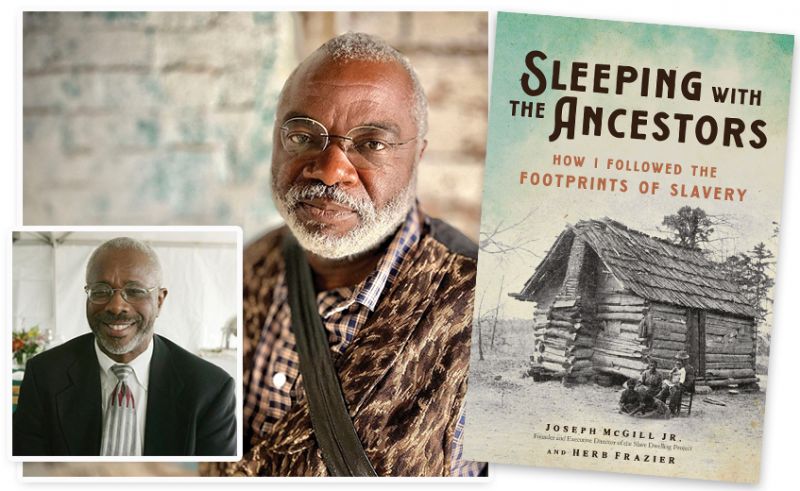McGill cowrote the book, which is being published June 6, with journalist Herb Frazier

A book cowritten by Joseph McGill Jr. (above) and Herb Frazier (inset) about McGill’s experiences sleeping in more than 200 dwellings where enslaved people once lived is being published this month.
If you’ve never visited Eliza’s House at Middleton Place or the slave cabins at McLeod, Magnolia, or Boone Hall plantations, put this magazine down now and go. They are small, humble, simple structures, yet they testify to the large and complex structures and systemic reality of injustice that this country, and the Lowcountry specifically, were built on. They are chapels, really. Bare-boned, dirt-floor, holy relics bearing witness to life, hardship, grief, suffering, joy, perseverance, birth, death—the stuff that makes us human, and at times, inhuman. Joseph McGill Jr. knows this better than most.
As founder of the Slave Dwelling Project, McGill has endeavored to bring these often overlooked and unpreserved buildings, and more importantly, the stories and history they still harbor, into the forefront. Since launching his project in 2010, McGill has spent the night in more than 200 dwellings formerly inhabited by the enslaved, across 25 states. His new book, Sleeping with the Ancestors: How I Followed the Footprints of Slavery, (Hachette Books, June 2023) cowritten with journalist Herb Frazier, recounts how the project started and evolved over 12 years and what he learned along the way.
McGill is well suited for the task. A Kingstree native, Army veteran, and South Carolina State University alumnus, he has worked with the National Trust for Historic Preservation; the African American Museum in Cedar Rapids, Iowa; and as the director of history and culture at Penn Center on St. Helena Island. He honed his storytelling skills while working as a park ranger for the National Park Service at Fort Sumter National Monument and through his hobby as an African American Civil War re-enactor.
In many ways, his travels to former plantations, university and college campuses, federal and state park sites, and the homes of former US presidents to spend sometimes restless nights in buildings haunted by slavery’s past are mini-re-enactments. They are not stunts or spectacle, however. McGill’s sleepovers are intended to raise awareness about “the huts of history’s shame” as poet Maya Angelou called the dwellings that are often kept in the shadows of the larger, more prominent plantation houses. Through this work, McGill is part of a growing movement to actively reshape how complex histories are told at sites in Charleston and beyond.
McGill credits his visit to Anne Frank’s attic hideaway in Amsterdam while he was in the service with showing him how the power of place can bring history, especially its painful parts, to life. Unlike Frank’s diary, McGill’s book is less a memoir delving into his personal reflections and the emotional impact of what these nights were like and more a catalog of the locations he has visited and their backstories.
In an era when the term “woke” is fraught, McGill opens our eyes by closing his, at least at night. From an initial idea spurred at Magnolia Plantation to spend the night in 10 or so South Carolina slave cabins, his Slave Dwelling Project has evolved into a thriving nonprofit, attracting international attention. He has achieved his goal of honoring the humble slave dwellings still in our midst and does so intentionally using the term “slave” (rather than “enslaved person”) because it is “my desire to be as frank as possible and not sugarcoat American history,” he writes. This book serves to further wash away that sugarcoating and awaken us to what it might have been like to work the fields all day then sleep on the floor at night, with a family of 10 crammed into one room. As McGill discovers, the realities were harsh and the comforts few, but in these pages, his dream of bringing those realities into the limelight are realized.
Events:
■ Book Signing: June 17 at Magnolia Plantation & Gardens
■ Living History: June 18, Assault on Battery Wagner on Morris Island, visit slavedwellingproject.org for more information.